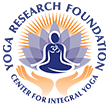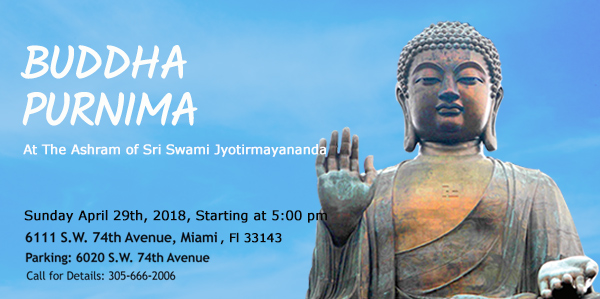The Yoga Research Foundation is pleased to announce our annual Buddha Purnima celebration on Sunday April 29th 2018 to be held at the ashram of our beloved Guru, Sri Swami Jyotirmayananda. We sincerely hope that you will join us as honored guests to partake in the festivities. Come enjoy fabulous vegetarian fare, delightful song and enchanting philosophical insights into the teachings of the Divine Lord Buddha. Here are some highlights from Swamiji’s teachings on the “Enlightened One”:
Buddha’s Perfection
Some twenty five centuries ago, a young prince sat under a peepal tree and resolved not to rise until he had gained a profound understanding into the mysteries of life. The young prince Siddhartha, who would later become known as the Buddha or the “Enlightened One,” incarnated to express the human aspect of Self-realization in the form of infinite compassion, universal love, and the principle of nonviolence. Today over one fourth of humanity follow the teachings of the Buddha in some capacity, and find within a refreshingly soothing formula that enables one to navigate the turbulent waters of life.
Buddha was born in the royal family of Suddhodana, the son of the King of Kapilavastu in Nepal. Despite efforts to shield the young prince from the harsh nature and misery associated with life, Siddhartha gained an awareness of an all pervading pain that underlies human existence. The story of Buddha is the story of one’s spiritual movement that grows out of the realization that an uncontrolled mind is the cause of pain, and finally seeks the stage where pain ceases in Nirvana.
The goal of all Buddhists is the attainment of nirvana, wherein ignorance is dispelled and suffering ceases. The Dhamma, or universal moral law articulated by Buddha that leads one to this state is presented as Four Noble Truths: universality of suffering, the origin of suffering, its extinction and the path followed to achieve extinction (the Eightfold Path).
The Dhamma as expounded by Buddha contains principles also found in other systems of philosophy. The state of nirvana spoken of is analogous to attainment of Brahman taught by Vedanta. A similarity can also be drawn between Buddhist principles and Yoga in that the cessation of pain occurs based on actions undertaken and not by blind acceptance. In fact, the teachings of Buddha are both complimentary and supplementary to the philosophy espoused by Yoga and Vedanta. There are four basic principles presented in Raja Yoga: Heya – there is pain; Heya Hetu – there is a cause of pain; Hanopaya – method of removal (eight limbs of Yoga); Hana – cessation of pain.
Buddha’s perfection is the ideal that humanity must continue to seek, wherein uncontrolled desires are extinguished, the mind is conquered, and the fetters of limitations are dropped from the infinite expansion of Consciousness.


